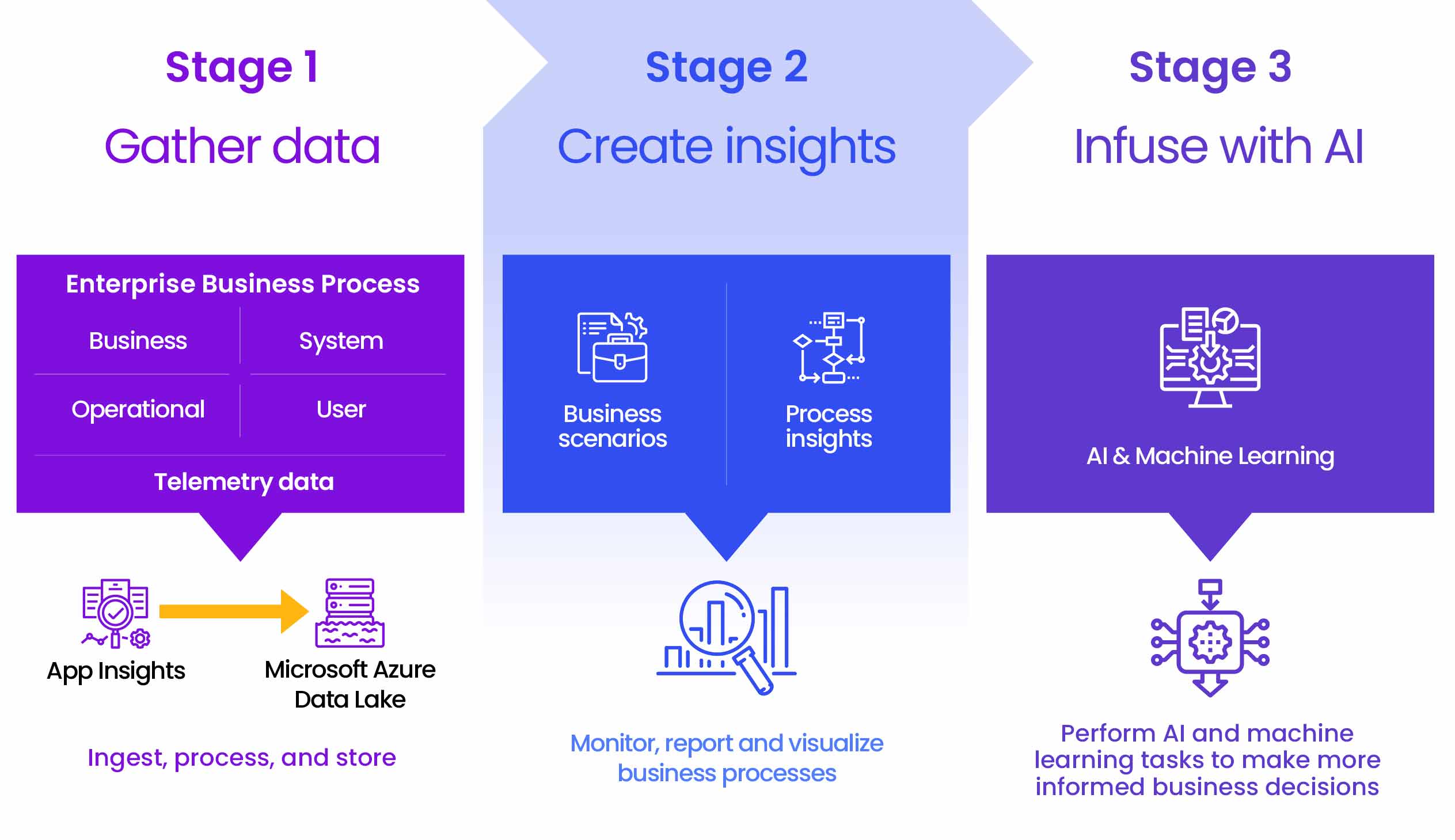
Listen to this blog
In today's data-centric business landscape, organizations are inundated with invaluable data generated from their day-to-day operations. The real challenge, however, is leveraging this data effectively to optimize processes, extract valuable insights, enhance efficiency, and propel business growth. This is where process mining emerges as a powerful analytical tool to unveil hidden insights and foster data-driven decision-making to refine processes grounded in real data.
Understanding process mining
Process mining stands as a pioneering domain and technology that aids businesses in comprehending their real processes and how they are operated. This technology helps identify opportunities for enhancement, automation, and digital transformation. As per Forbes, AI-powered analysis and process optimization are projected to increase efficiency by 31%, thereby eradicating delays, improving efficiency, and elevating user experience.
Furthermore, it extracts knowledge from event logs, facilitating organizations to customize process mining reports, determine the root cause of inefficiencies, and monitor KPIs. It also compares, reconstructs, illustrates, and analyzes their processes in a data-centric manner. The event logs document various activities executed within the business, recording essential data on timestamps, activities, involved resources, and the interconnections among them.
Overall, the process mining capability is an asset for businesses seeking to improve their operational efficiency and make informed decisions.
Microsoft’s approach to harnessing Power Automate for process mining
At first glance, Microsoft’s process mining solution works like any other process mining technology. Process mining tools delve deep into an organization’s vast data reservoir by investigating its event logs. That is where the technology’s namesake comes from—event logs are mined for processes.
Event logs are repositories of data that archive details like software logins within an organization’s technology suite and the interactions within that software.
Process mining solutions, such as Microsoft Power Automate Process Mining, discern patterns within these event logs and showcase end-to-end business processes, thereby enabling smarter decisions. This includes common variants of those processes that might be inducing errors or inefficiencies.
One of Microsoft’s differentiators, particularly with the inclusion of AI, is that users receive intuitive suggestions on how to optimize those processes or transform them with automation in Power Automate or even a bespoke business application built in Power Apps.
Microsoft’s process mining technology is also particularly adept at deriving transformative process insights from prevalent business applications like SAP. Yet, it also seamlessly integrates with the broader Microsoft suite, including Power Automate, Power Apps, Power Virtual Agents, and Azure. Diving deeper into the intricacies of Microsoft's process mining technology, it's essential to understand its systematic approach. This approach is broadly categorized into three stages, demonstrated in the figure below, encapsulating the essence of Power Automate.

What are the advantages of using Microsoft Power Automate Process Mining?
At its core, process mining offers pivotal insights that can empower organizations to refine their operations, enhance customer satisfaction, and maintain a competitive edge in an ever-evolving business landscape. To further shed light, let’s delve into the specific sectors and explore how they can benefit from this technology:
Telecommunication
- Streamline the activation process to reduce wait times
- Simplify business operations to cut down costs and complexity
- Manage high-volume content analytics
Financial services
- Accelerate the time to value for small and medium-sized businesses
- Ensure compliance by keeping up with regulatory changes and mitigating risks
- Counteract competition from fintech innovators
Manufacturing
- Address supply chain disruptions to ensure timely delivery of products
- Embrace new automation to boost efficiency and productivity
Automotive
- Accelerate transformation to mobility providers to remain competitive
- Detect inefficiencies in production processes, such as long cycle times and recurrent downtimes
- Identify and address quality issues promptly, reducing the likelihood of costly recalls or warranty claims
Customer service desk
- Spot standardization opportunities to minimize rework and eliminate unresolved cases
- Analyze return reasons and improve customer satisfaction through performance monitoring
These areas represent key challenges and opportunities for businesses to improve their operations, remain competitive, and meet the needs of their customers.
Easily identify automation prospects to accelerate RPA at scale
Organizations have witnessed significant returns from the automation strategies they have cultivated. Yet, scaling remains a formidable challenge. One of the barriers to scale is automating the wrong processes. Another is the ineffective and slow methods to identify optimal automation prospects that are resilient and promise high returns. Microsoft Power Automate Process Mining both uncovers and suggests business processes where automation stands as the most suitable transformational approach, thereby fostering RPA at scale for greater returns.
Increase operational efficiency
Because of its AI foundation, Power Automate Process Mining can be used to apply recommended KPIs to pinpoint where process inefficiencies exist so they can be re-engineered and eliminated. It also offers avenues for rapid value realization with department-specific templates. For example, there are finance templates that include order-to-cash, peer-to-peer pay, and supply chain use cases that stakeholders can swiftly utilize.
Implement continuous process improvement
Microsoft’s process mining technology also enables organizations to easily implement continuous process improvement strategies through constant process monitoring. You can effortlessly detect process deviations or set up alerts via Microsoft Teams or Outlook when predefined process KPIs are not met.
Ensure compliance
One of the paramount benefits of process mining technology is its ability to identify non-compliant processes. For enterprises operating in stringently regulated industries, a solution like Microsoft’s is crucial to ensure that executed processes – whether they involve handling sensitive data or adhering to data retention policies, remain compliant and risk-free.
How is Copilot democratizing process mining?
With the integration of Copilot in Power Automate Process Mining, deriving these insights becomes quick and straightforward, empowering everyone in your organization to make data-driven decisions. Copilot, the latest addition, serves as an intelligent assistant for process analysts and automation experts. It leverages the power of AI to provide real-time guidance and recommendations throughout the process journey. Copilot in Power Automate Process Mining assists you in discovering processes from your event logs and aligning attributes to the requisite data schema. Uncovering your top insights now only requires a quick exchange with Copilot, which iteratively works with you to answer questions on your data, highlighting automation or optimization recommendations. Copilot even presents one-click suggestions of other Copilots, sharing the context of your process goals to get to automation and solutions faster.
In summary, the fusion of process mining and Power Automate within the Power Platform presents a robust solution for organizations striving to optimize their operations. By deciphering insights through process mining and harnessing the automation capabilities of Power Automate within the Power Platform, businesses can enhance their efficiency, reduce costs, and stay ahead in a competitive landscape. The journey may be challenging, but the rewards are transformational. Embrace this powerful synergy and pave the way for a more streamlined and productive future, all encapsulated within the versatile Power Platform ecosystem.




